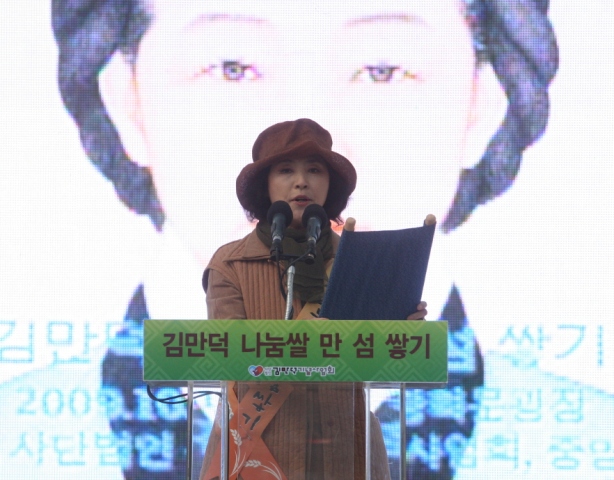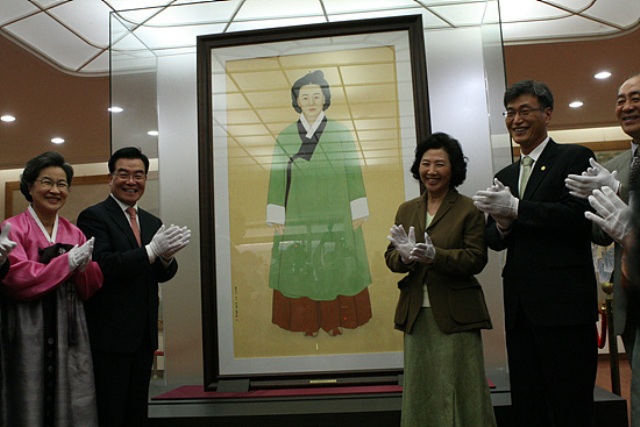| |
 |
|
| ▲ Photo Courtesy Kim Mandeok Memorial Society |
The preeminent master calligrapher and Jeju exile, Kim Jeong-hui, wrote “Eun-gwang-yeon-she” in the 1840s. The tablet work, whose title means “Benevolent light shining upon the world,” commemorates Kim Mandeok’s (1739-1812) good deeds for the Jeju people, and her spirit of altruism and compassion still shines today.
On July 28, 2007, a 1,000-sack rice collection in Kim Mandeok’s honor was held at Gwandeokjeong Square in Jeju City. It was hosted by the Kim Mandeok Memorial Society and even school children participated in collecting 1,300 sacks of 80 k.g. each for donation. The rice was then given to 60 social welfare centers and 3,900 Jeju people in need, such as teens heading households and elderly people living alone.
On Oct. 17th, 2009, to mark the UN International Day for the Eradication of Poverty, a 10,000 sack collection was held in Kim Mandeok’s name, with the same hosts, but this time at Gwanghwamun Square in downtown Seoul. The event had grown 10-fold in two years, and was broadcast live on nationwide public broadcaster, KBS. Ban Ki-moon, UN secretary-general, said in a special video message, “‘The Kim Mandeok rice collection is a noble work in the same vein as the UN endeavor to help a billion of the absolute poorest in the world.”
Citizenry across the country, including 1.3 million elementary, middle and high school students in Seoul, participated in the campaign and, above expectations, 22,000 sacks of rice were collected. Of these, 12,000 sacks were sent to struggling families in Korea and the remaining 10,000 went to African children at risk of starvation. In December 2012, to mark the 200th anniversary of Kim Mandeok’s death, a 10,000-sack rice collection was again broadcast live on TV, held simultaneously at Gwandeokjeong Square and Seoul City Hall Plaza.
Amidst these relief campaigns is a famous Jeju-born actress, Go Doo-shim, dubbed “the nation's mother.” She is the only actress in Korea to have won “Best Performance” accolades from all three major broadcasting companies in Korea: KBS, MBC, and SBS.
It was acting that forged the special bond between Go Doo-shim and Kim Mandeok, despite the years separating them. In 1976, Ko—a new face at 25 years of age—portrayed Mandeok for MBC TV in the soap opera “Fire of Passion.” Go passionately recreated Mandeok’s life as she tackled various difficulties, with moments of deep-rooted self-actualization leading to selfless charity. By the end of its run, the drama was a big hit and a monument was erected to commemorate Mandeok.
Born in Korea’s Joseon era, more than 200 years ago, Kim Mandeok was the youngest of two sons and one daughter from a poor family. When she was twelve, her parents died of plague and she was given to a retired “gisaeng,” a female entertainer and servant for aristocrats. At the age of 18, Mandeok graduated to become a gisaeng herself, in the county of Jeju-mok. When she turned 23, she was reinstated as an ordinary citizen in accordance with her original family register.
| |
 |
|
| ▲ Photo courtesy Jeju Special Self-Governing Province |
Mandeok went on to open a merchants’ inn and also a commission agency for port trade outside the East Gate of Jeju Castle. There, she sold Jeju specialties such as horsehair, sea mustard, abalone and ox bezoar to Seoul and other regions. She also supplied Jeju women from the aristocratic or “yangban” class with cloth, accessories, and cosmetics. In this way, Mandeok amassed a great fortune.
Then, after consecutive poor harvests over five years from 1790, about a third of the Jeju people starved to death from a total of 65,000. As such, in 1794, in the 18th year of King Jeongjo’s reign, Mandeok chartered a ship and purchased 1,000 sacks of rice and crops, exhausting all her wealth. She distributed the food to the starving Jeju people.
When the Jeju governor reported her good deeds to the royal court, King Jeongjo gave her the title of “Uinyeobansu,” the highest government post for a female. Mandeok met King Jeongjo in person in 1796 and also made a sightseeing trip to Mt. Geumgang on the mainland, which was considered a sacred site at that time.
In 2002, Go Doo-shim, her career now 30 years old, walked around Jeju Island for eight days to raise money to build a Jeju Artists’ Center. In 2003, she gave generously to establish the “Kim Mandeok Memorial Society” in partnership with Dr. Yang Won-chan. In 2009, she almost gave up one of her acting roles in order to join in the “Mandeok rice collection,” before in 2010, at 59 years of age, she played the mentor ‘halmang’ and narrated the role of the protagonist again, Kim Mandeok, for the epic KBS drama, “The Great Merchant.”
Events held by the Mandeok Memorial Society provoked great sympathy among Korean citizens’ as they promoted the deeds of Mandeok. Schools were even constructed for illiterate children in rural Vietnam in 2012, with 450 million won and 900 million from the rice collection campaigns funding Khanh Hoa Jeju Elementary School and Van Phu Mandeok Middle School, respectively.
Then, last May, the International Federation of Business and Professional Women International Congress was held at the ICC Jeju, highlighting Kim Mandeok’s life as a “Woman Leader” and iconic businesswoman in Korea. Hundreds of women leaders from more than 60 countries at the congress agreed that Kim Mandeok was the first female “CEO of Korea” who, as a common islander, overcame discrimination in a Joseon-era, male-dominated society to show “noblesse oblige” by her actions.
This led to the formation of the “Kim Mandeok Memorial Society” and BPW International even created an annual “Kim Mandeok Award” to recognize two outstanding international women in the business and charity sectors.
The message is clear: Kim Mandeok’s life of sharing with those in need is timeless, universal and flourishing. |





















